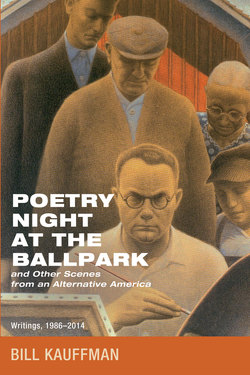Читать книгу Poetry Night at the Ballpark and Other Scenes from an Alternative America - Bill Kauffman - Страница 19
На сайте Литреса книга снята с продажи.
The John Wilkes Booth of American Poetry
ОглавлениеThe American Enterprise, 1999
Once upon a time, Americans bought books of poetry, and no volume was better loved than Edgar Lee Masters’s Spoon River Anthology (1915), that erstwhile staple of high-school English class in which an Illinois town is revealed by the epitaphs on its cemetery tombstones.
Masters was a Chicago lawyer and one-time partner of Clarence Darrow, whom he disdained as a headline-hogging welsher. (He refuses to mention Darrow by name in his splenetic autobiography.) But Edgar Lee Masters came from the Land of Lincoln—Menard County—and his single most enduring poem mythicized the girl whose early death may or may not have been the emotional climacteric of Abraham Lincoln’s life:
I am Anne Rutledge who sleep beneath these weeds,
Beloved in life of Abraham Lincoln,
Wedded to him, not through union,
But through separation.
Bloom forever, O Republic,
From the dust of my bosom!
In a span of sixteen years, Masters went from cherished prairie poet to reviled heretic. For in 1931 he published Lincoln: The Man, a biography of passionate bitterness and patriotic rage. Masters, you see, was a Stephen Douglas man who thought it time to even the score, given that “[t]he political history of America has been written . . . by centralists and . . . New England.”
The poet was an old-fashioned states-rights Democrat with a populist bent and a burning enmity toward the Republican Party, which was “conceived in hatred and mothered in hatred.” His grievance was that “every President since Lincoln has imitated Lincoln instead of Jefferson,” and his intention was to bring all those statues of Honest Abe crashing to the ground, for only by smashing the Lincoln myth might America “rise out of the hypocrisy and the materialism into which it was sunk by the War.”
In Masters’s telling, Lincoln was “cold,” “undersexed” (Mary Todd was no Anne Rutledge!), and a “Jehovah man” who may not have believed in God but fancied himself in the role, Old Testament style. Masters is relentless, scourging Lincoln for over 500 pages as intellectually lethargic, unkempt, utterly lacking the milk of human kindness, and a mediocre lawyer to boot.
The book was an act of professional suicide for Masters—himself a cold, though decidedly not undersexed, man—but one that he was born to write. His family homestead was just seven miles from Lincoln’s New Salem, Illinois. Masters’s grandfather had once retained lawyer Lincoln in a land dispute—which Lincoln lost. Grandfather Masters served in the Illinois legislature, where he voted against U.S. Senate candidate Abraham Lincoln “because he thought Lincoln’s policies would bring on war between the states.”
Hardin Wallace Masters, the poet’s father, was a law partner of William Herndon, who had been Lincoln’s old law partner and the author of the frankest biography by a Lincoln intimate. (Herndon was also an Anne Rutledge partisan; Mary Todd hated him.) Hardin Masters wanted to write his own Lincoln book, based on Herndon’s recollections and the gossip of old-timers; he never completed it, though in a way his son did, in an act of filial piety.
Lincoln: The Man was published in February 1931, just in time for Lincoln Day, and for a few weeks the icon-smashing poet became a new John Wilkes Booth. (“Booth’s bullet was the last one fired for States’ Rights,” wrote Masters.)
Edgar Lee Masters had grown up in Petersburg, Illinois, in a time and place where Lincoln was not yet a deity but just a man (and of course a prophet is always without honor in his hometown—leaving aside the question of whether the prophet was Lincoln or Masters). But by 1931 the sixteenth president was encased in myth even in Petersburg: angry Lincolnians threatened to erase Masters’s verse from Anne Rutledge’s tombstone, on which it had recently been incised. (Some regarded it as an insult to Mary Todd Lincoln anyway.)
Masters, something of a misanthrope and most emphatically not a cockeyed optimist, was not exactly shocked by the envenomed response to his book. In his own young adulthood, he confessed, “I had an admiration for Lincoln, even believing the falsehood that the War Between the States was inevitable and the result of an irrepressible conflict, though my grandfather, who knew Lincoln there in the Petersburg-New Salem country, had given me the materials for a very different judgment of Lincoln.” But while the poet had his grandfather, the rest of the country made do with Carl Sandburg’s hagiography.
As an old man, Masters dreamed of returning to Petersburg, the site of his Lincoln-washed youth. But he had long lost his prairie spirit; in his last years, he cocooned himself in a New York City hotel and refused even to cross the street. Only death took him home to Petersburg, where he is buried four graves down from Anne Rutledge, wedded to her not through union but through verse.
